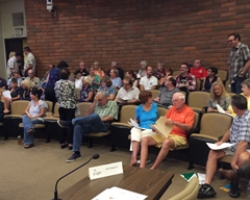Before a packed council chamber, following hours of public testimony, the City Council this week directed staff to come back with a simpler ordinance to allow live, amplified music in Seal Beach businesses. The ordinance is expected to come back to the council in November.
In the meantime, Mayor Ellery Deaton said that the city code would continue to be enforced by complaint.
Deaton said she was pleased by the resident participation and debate. “There were so many good ideas suggested. I took notes,” Deaton said.
The proposal by the city was rejected when residents and business owners took to the podium to air their concerns. The proposal brought forth by the city would have made Jim Basham, the director of Community Development, in charge of the permitting process. Now, it seems to be the consensus that the Planning Commission will review Entertainment Permits on a case-by-case basis.
The original proposal would have required applicants to submit a survey by a sound engineer as part of the application process and to add soundproofing to the establishments. That requirement may be scuttled; it was unclear if the newer version of the ordinance will address that issue.
Part of the new proposal is expected to require the city to print notices in the newspaper when the Entertainment Permits are requested, and to also notify nearby residents.
Many citizens explicitly said they wanted the Planning Commission to issue entertainment permits. Others raised concerns about the costs of the sound survey requirements and whether it would be possible to keep the sound of amplified music inside the walls of a business. Live amplified music used to be legal throughout the city, but a 2010 revision to the Zoning Code ultimately eliminated legal amplified entertainment—except on the street, for special events and at four area businesses: Spaghettini’s, Kobe’s Bistro, Mahe and Dave’s Other Place. Those businesses were grandfathered into the code.
Resident Elizabeth Kane said that she was confused about how the proposed live music ordinance got so complicated, pointing out that the issue had been simple before the passage of Title 11 of the Zoning Code.
Basham raised the concern that if the code was not specific enough, the city would lose court cases intended to enforce the code.
Resident and business owner Wendi Rothman said she was concerned about the direction the City Council was taking in allowing more liquor licenses in Old Town.
However, the number of liquor licenses was not up for discussion. As for the entertainment issue, she said she would like to see music back in the hands of the Planning Commission.
Scott Levitt, an attorney representing Taco Surf at its Surfside location, opposed having the Planning Commission issue the permits, preferring an over-the-counter permitting process. Patty Campbell of College Park East asked if the City Council could give Taco Surf a 90-day emergency permit. However, Deaton said that isn’t legal under the current city code.
“Lucky John” Domingue, a local street performer, said the proposed ordinance was “for the most part” a great plan, but the sound barrier requirement was too expensive. He also said the courts have ruled that cities cannot require street performers to have permits. Street musicians (called “Buskers”) can be seen on Main Street on most weekends. A group called the Fun House Porcupines plays in front of Walt’s Wharf most Saturday and Sunday evenings until roughly 9 p.m.
Carla Watson carried a ukulele to the podium. “Music does add flavor to a town,” she said. She said her concern was accountability. She said the planning commissioners were more accountable than city staff.
Charles Antos, a former council member, said the Planning Commission was set up to deal with land issues.
He also pointed out that only a 15-foot alley separated some residents from Main Street businesses.
Responding to comments that most business owners don’t live in Seal Beach, Chamber President Tom Rowe, owner of the Abbey, said that while he was not a resident he was here six to seven days a week. He supported proposed limits on the hours live music was performed, but did not support limits on the number of band members. He also said he didn’t think the sound survey was reasonable.
Robert Goldberg, a former planning commissioner, said the current code allows unamplified music and poetry readings without a permit. Goldberg also questioned whether it would be possible to contain music inside the walls of a business.












